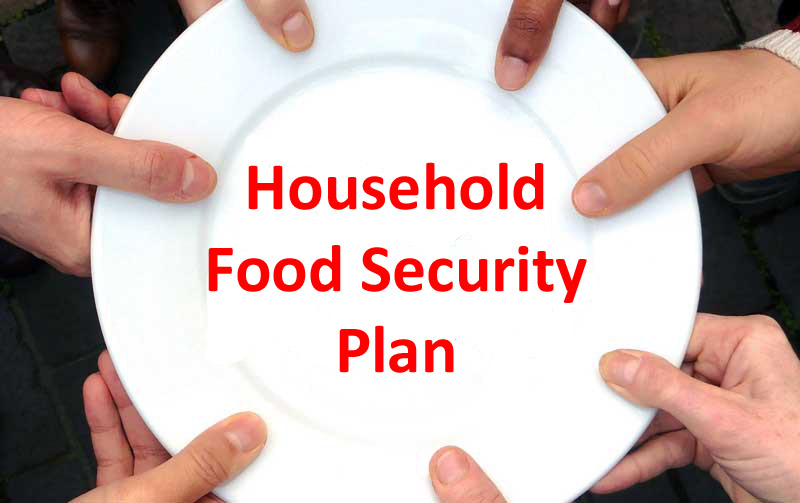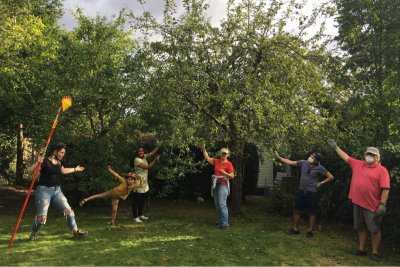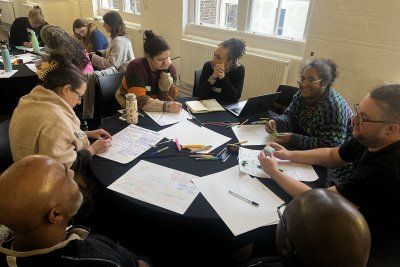 Photo credit: Sustain
Photo credit: Sustain

Now is the time for a national household food security plan
Millions of people are struggling to put food on the table. When lockdown eases, hunger will not go away. It's time for a National Food Security Plan, says Sustain's chief executive Kath Dalmeny.
Local authorities, food businesses, voluntary groups and communities have stepped up impressively to the task of helping provide emergency food aid to hundreds of thousands of people falling into food crisis during Covid-19 lockdown. Multi-million pounds' worth of food, financial donations, food vouchers and staff time have either been paid for by government and local authorities for the shielded, or donated to charities, food banks, schools and community initiatives, to feed the homeless, older people stuck at home without support, families struggling to make ends meet due to job losses, and vulnerable people who have fallen through the safety net.
The need is gigantic, the emergency response eye-watering, and yet many people are still going hungry. Surely the end of lockdown will offer relief? When it comes to food, unfortunately not. Lots of people are still struggling to access food, and lots of people are running out of money.
During lockdown, the biggest food bank network Trussell Trust reports an 81% increase in referral of people experiencing destitution and hunger since the same period last year, with 122% more children. Food banks in the Independent Food Aid Network (IFAN) report an average 59% increase in need from February to March 2020. The Food Foundation estimates that 200,000 children have had to skip meals due to family income being too low, and there is a long summer break ahead where many children will experience holiday hunger.
A staggering 1.8 million people have signed on for Universal Credit due to job losses, with pre-Covid patterns suggesting that many will need to resort to food aid in the near future. According to the Resolution Foundation, one in eight (13%) of current workers think it is likely they will lose their job in the next three months; more than one in seven (15%) believe they will be furloughed; and nearly a quarter (23%) think their hours will be reduced. The same data shows that job and hours losses are much more common among lower-earning employees.
There seems little prospect that mass household food insecurity will abate any time soon, and may well grow substantially.
We must now ask a fundamental question: What's the food plan? Who should people turn to if they are struggling to put food on the table, either due to being isolated or due to having too little money? What will happen if food prices go up, due to the likely impact of farm worker shortages and extreme weather events on planting and harvesting? Should we expect supermarkets to continue to donate food at gigantic scale to frontline charities already at their wits’ end? Should local authorities buy food in very large amounts and continue food parcel deliveries? Should meals on wheels services be re-established nationally as a dignified entitlement for older and isolated people who may live in virtual lockdown all year round? How will local authorities afford it? And should the social security safety net be re-calculated by Government to offer sufficient income to cover the basic costs of living, including food? We must face these challenges head on.
I've spent the past two months of lockdown liaising in countless Zoom meetings with several government departments, numerous local authorities, food businesses, social policy organisations and charitable food aid groups, working with many others to try and wrestle a solution to this weighty conundrum.
On 29 April, the Westminster Government issued its "guidance for people on accessing food and essential supplies". Unfortunately, the government signalled solutions only for those who have enough money to buy food (supermarket delivery slots, volunteer shoppers, etc.). Financial insecurity as a factor in Covid-19 food vulnerability was not addressed, being recognised officially for the first time on 8 May when Defra Secretary George Eustice mentioned it in the daily Covid briefing, offering a temporary fund to buy food for 12 weeks for 5,000 frontline charities such as homeless shelters, rehabilitation programmes and domestic violence refuges. Government said in its 29 April guidance that people having no other means of support should contact their local authority. Some may fare better, if they live in the devolved nations, where for example holiday hunger programmes have more widespread support. But otherwise, it’s a postcode lottery whether people will get a crisis grant, referral to a food parcel or scheme, be sent to a charitable food bank, or told that the cupboard is bare.
The light is dawning that someone, somewhere in this system, will have to pay for the food for millions of people on very low income or destitute, probably for a long period. Without a National Household Food Security Plan, it appears that local authorities, the grocery trade and frontline charities could be expected to feed millions of people for free for many months to come. This is untenable.
Sustain is joining others in calling for a National Household Food Security Plan. We must look beyond the food bank. Charity is not the answer to financial hardship and hunger, especially at such large scale. Governments all over the world, hit by the twin avalanches of Covid-19 and household food insecurity, are now grappling with these issues. A National Household Food Insecurity Plan must involve large-scale and workable solutions to household food insecurity, ranging from adequate wages and social security benefits, through holiday hunger and enrichment programmes for children from disadvantaged backgrounds, to meals on wheels provision for older people. This would be better for everyone – older people, families, schools, local authorities and food businesses, as part of a Covid food recovery plan that works for everyone. We must build back better. Please join us.
Kath Dalmeny is chief executive of Sustain: the alliance for better food and farming, and food vulnerability lead for the alliance during Covid-19. She is a member of the London Food Board; the Greater London Authority’s Strategic Coordination Group on Covid-19 food aid; and, with other VCS groups, participates in liaison meetings with the Government’s Covid-19 Food and Vulnerability Directorate.
Sign the petition from 16-year-old Christina calling for free school meals for 1.3 million children, to help prevent them going hungry during the school holidays.
Food Poverty: Championing people-powered projects that tackle the root causes of food poverty.
Sustain
The Green House
244-254 Cambridge Heath Road
London E2 9DA
020 3559 6777
sustain@sustainweb.org
Sustain advocates food and agriculture policies and practices that enhance the health and welfare of people and animals, improve the working and living environment, promote equity and enrich society and culture.
© Sustain 2026
Registered charity (no. 1018643)
Data privacy & cookies
Icons by Icons8







